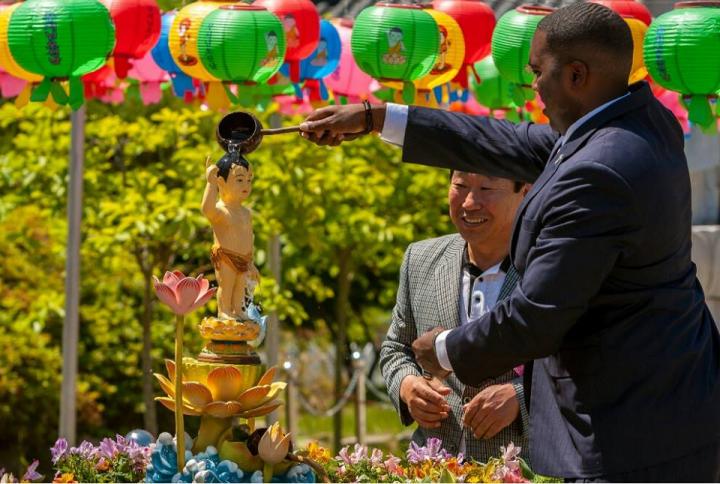



There’s a lot of Buddhist and Confucian history in Korea, as both religions played significant roles in the history of the country. My wife’s family has 2 Confucian Sages (Jangsaeng & Jip Kim), 4 Ceong-back-ri (persons noted for integrity in the official Korean history records) (Yakhang, Gyeomgwang, Gae & Jangsaeng Kim) and 7 Chief Scholors (keepers of Korean hisotry) ( Ikhui, Mangi, Manjung, Jingyu, Yangtaek, Sanghyeon & Yeongsu Kim).
Last year we spend Buddha’s birthday in Daegu with family friends that are Buddhist Monks attending a commemoration ceremony. We really enjoyed this opportunity and remain grateful for the invitation. This year to commemorate the day, I spent the day with my son and 3 friends touring Gyeongbokgun, where Kings of the Buddhist faith once ruled the country.
Buddhism noble truths, are: Suffering exist, Suffering has a cause, namely, desire. Desire is the only cause of suffering. There is a way to end desire. One need only accept these statements to be a Buddhist. An elaboration on the fourth Noble Truth is the below Eightfold Path, which is a series of steps for Buddhist adherents to follow in order; Right views, Right intention, Right speech, Right conduct, Right livelihood, Right strivings, Right mindset, and Right concentration. If one uses the Eightfold Path to attempt to achieve the fourth Noble Truth, then one uses Buddhist tradition. “Buddha” comes from a Sanskrit word meaning “enlightened,” “knowing,” or “awake.” In Buddhism it is used as a title for anyone who has achieved enlightenment.
Confucianism emphasizes harmony within human society; by means of Confucianism one may learn of and practice right behavior with immediate benefit. Confucianism bears a strong resemblance to Western Secular Humanism; however, it has a legacy of academic excellence nearly unbroken for over two-thousand years; world religion embedded into Chinese folk religion and within Korean and Japanese social values. Confucius was a great teacher born in China ca550 BCE. The major teachings of Confucius refer to a concept of li, which is a Chinese word meaning “offering” but which refers to formal ritual. Confucius loved li and used it as a means to inspire participants to profound accomplishments; at the same time, he sought to create the society which could appreciate, rather than simply perform, li; related concept- ren, which is both a feeling of love for others and the attribute of benevolence; grants personal success and spiritual fulfillment to the practitioner.